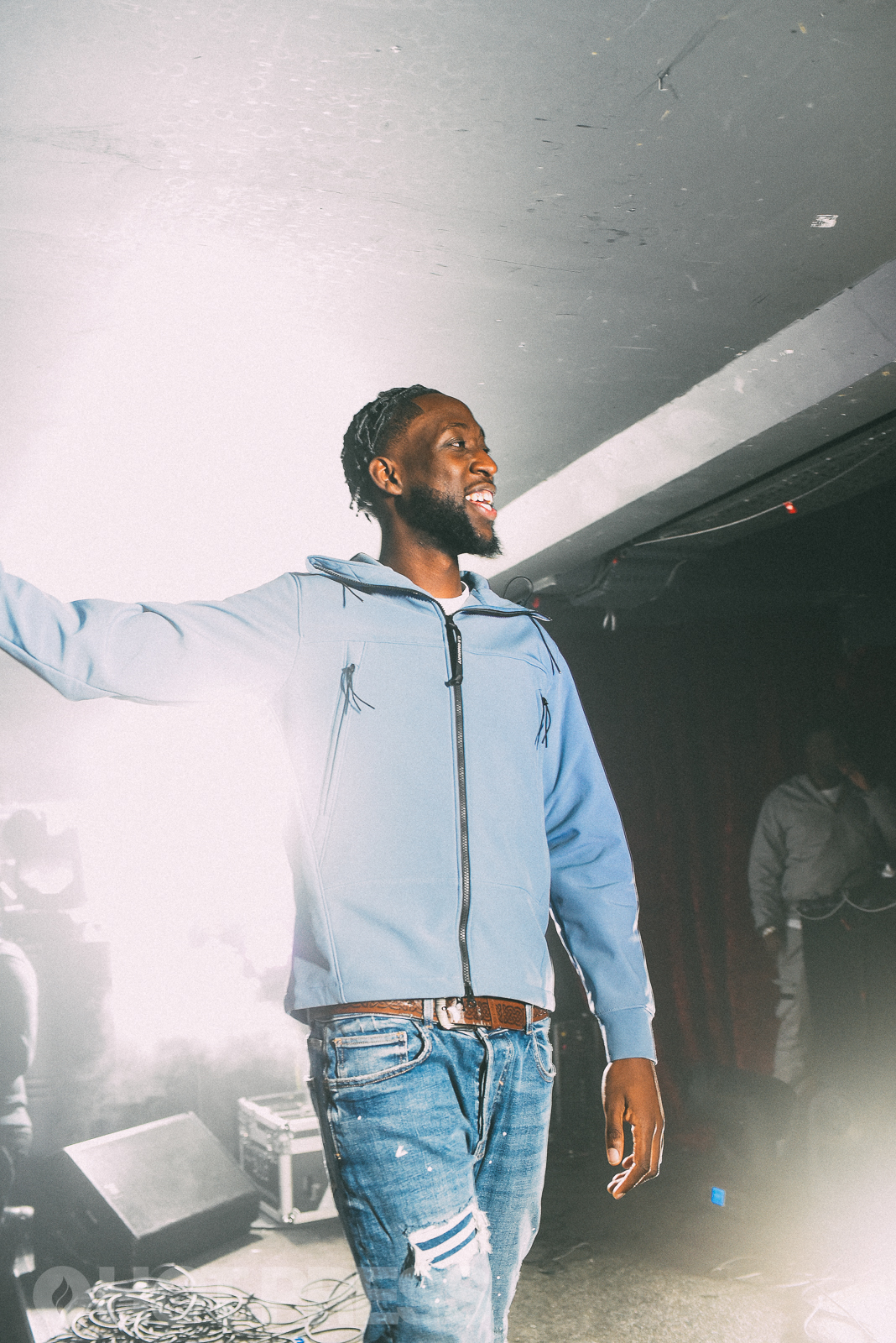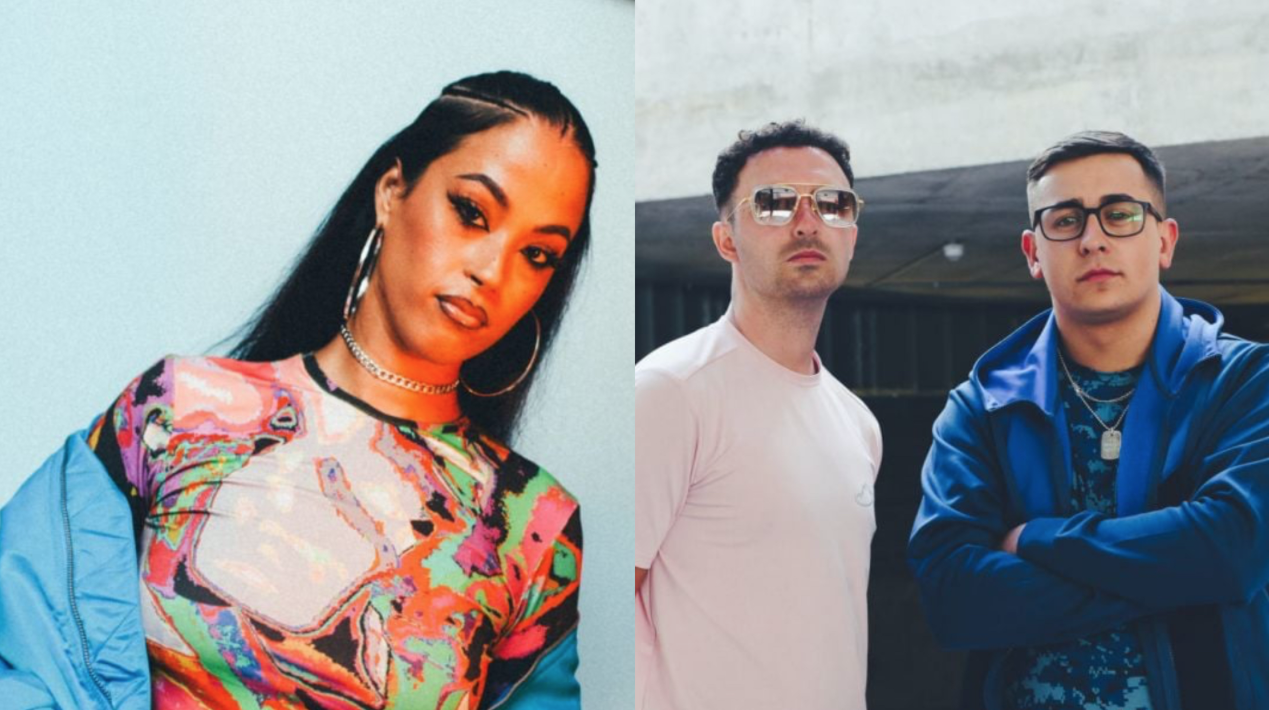- Music
- 22 Jul 24
Simba: "When I made the studio that was the aim, to help Irish artists from A to B. They’ve gone from A and now they’re at X,Y,Z"

Dundalk producer Simba on how he made his Jungle Beam Studio into a roaring success.
Sat like a king in his self-made studio, Simba is perfectly comfortable in his jungle -themed musical den, while discussing his upbringing and how his business Jungle Beam Studio came to be.
Life in Ireland began in a sorting centre called Kilmacud House, before Simba’s family were moved to Direct Provision. After that, it was house after house, caravan parks and hotels, before finally settling in Dundalk, where he calls home.
“It’s mad, because I went past it a couple of months ago,” he reflects. “I was like, ‘Woah, that’s crazy, it’s still the exact same way.’ Over the past few years, when I think about it, I’m like, ‘That was a bit mad, wasn’t it?’
“Then again, it taught me people skills. I’d get to a new place, to a new school and I’d have to make friends straight away.”
Coming from humble beginnings, Simba would sneak artists into his living room to make music while his family were out. He admits that although his Dad, who is a pastor, wouldn’t like the music he made, he remains Simba’s greatest source of strength throughout his life.
“He wouldn’t let us know much about what’s going on,” the producer notes. “Sometimes when he comes back after a long day, I see in his face that maybe that day was tough. But then he gets up in the morning, and goes back and does it all again.”
His Dad would also have to set up a church wherever they moved, starting fresh with each new congregation.
“I’ve seen him start churches from hotels and make them into big churches,” says Simba. “So, I guess that also feeds into where my entrepreneurial spirit comes from. That’s probably why when moving around, I didn’t throw tantrums a lot because it was God’s will. That helped a lot. And it has been a core foundation in my life, for sure.”
This powerful connection to faith is what introduced Simba to making music and eventually led to him becoming a producer. Starting out as a gospel rapper in his Dad’s church and at prayer conventions, he eventually felt he’d achieved everything possible in gospel-rap in just two years.
“With rap in general, I felt there was a ceiling,” he says. “I was getting down about it. So I was like, you know what, there’s no need for me to get down about this. How else can I channel this love for music?”
Speaking about artists trying to emulate the work of those who’ve found success before them, Simba felt passionately about every artist embracing their individuality. “I don’t see the point in trying to be what’s already there,” he says. “When an artist starts rapping or singing, and I can pinpoint what they’re trying to sound like, I say, ‘Yeah, you’re really talented, but I just think of another song straight away.’”
He walks me through an experience he often has with artists in his studio.
“What’s going to make labels, or even consumers, want to listen to you when the original is already there?” Simba continues. “So I try to champion people being unique and being themselves, because that’s the way we’re gonna move forward. The internet really skewed our opinion of music. Let’s say Dr. Dre and Snoop Dogg, when you listen to their music, they’re painting a picture of California where they’re from. But nowadays, it’s hard for an artist to paint that picture, because we all know what it’s like in California just by going on the internet.”
Notably, rapper Selló walked into Jungle Beam Studio in the past under a mysterious different name (“I’m not gonna say it now, because I don’t think he’s put it out before,” Simba laughs). Subsequently, Selló returned years later to record the mixtape Sellótape, following his successes with ‘Dublin’ and ‘As Gaeilge’.
 Selló at The Academy Green Room. Saturday 10th of December 2022. Copyright Miguel Ruiz.
Selló at The Academy Green Room. Saturday 10th of December 2022. Copyright Miguel Ruiz.“Working with Selló is interesting, because he’s a creative guy,” says Simba. “We’ll be sitting there, working on something, and he’ll jump up saying, ‘No, no, no, scrap everything! Let me get in there, I’ve got something new!’ And then he puts something new down, and it just works.”
When speaking about Selló, who still works in social care, Simba recognises an unfortunate, but common, reality for Irish artists, ie. the need to have another job when trying to make it.
“It’s trying to guarantee a future,” he reasons. “Because say you do a festival this year, the next year, they might not want to book you because you’ve done it already. As an artist, you need to be creative in ways to sustain yourself for a long time. If money isn’t coming in on the music, and you end up being down about it, it ends up affecting your mental health – and then you can’t even put yourself into the music. So, I always tell people to make sure that part of your life is good.”
As well as Sellótape, Jungle Beam Studios witnessed the birth of Belters Only and Jazzy’s ‘Make Me Feel Good’, which Simba tells me was recorded in about two hours at 12am, after Robbie G urgently called him saying, “We need to do this tonight.”
“They played the beat and I thought, this is cold,” says Simba. “Then we recorded and got it done in about two hours. Robbie and Bissett were in the back going, ‘We’re gonna do this to this part, then that part.’ I remember thinking, ‘Boys, this is cold, but can we go home now?’ (laughs). Then I sent them the track and forgot about it. A year later, Robbie called me and said, ‘Simba, you know that song is going crazy?’
“I got into my car and it was on the radio, it was going mad in the UK. People were making TikToks with it, and the next thing I know, I’m getting a platinum plaque for the studio. It’s rewarding, because when I made the studio that was the aim, to help Irish artists from A to B. They’ve gone from A and now they’re at X,Y,Z.”
 Jazzy and Belters Only. Copyright Miguel Ruiz.
Jazzy and Belters Only. Copyright Miguel Ruiz.The industry has come a long way since Simba began his music career, from a time where urban musicians had to fight to stay afloat above “the noise”, to a time where many artists get signed to record labels and appear in the charts.
“The climate is in a much better place,” nods Simba. “Just this year, TraviS & Elzzz were number one in the charts. Last year, they were number eight, then number two, and the year before, Selló was number eight as well. Back when I started, that was unheard of, you couldn’t see that was going to happen. Now labels are looking to sign urban artists, because we’ve made enough noise for them to be like, ‘Oh, these Irish guys are onto something.’ I think the next couple of years will be even better than what we’ve already seen.”










